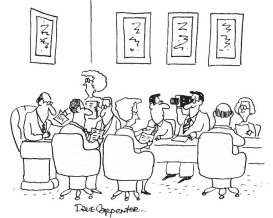|
Opinion- 19 July 2004 |
|
Politics here, politics there, opinion polls, budgets, election talk, Peter Garrett, Kim Beazley -- the air is filled with the whiff of politics but never a sniff of perfume for science.
Oh there was talk of some billions for science after the budget but it turned out to be a mirage. The Prime Minister took it on himself to make the announcement which soon showed that Backing Australia's Ability was merely getting an extension into the close of the decade. After the PM came Science Minister McGauran to assure the electorate that money for scientific research would be tied to pretty quick monetary return. He didn't say it but he meant that "curiosity science" was not on the agenda..
Did hordes of voters sigh with relief that they wouldn't have to pay for any of that self-indulgent "curiosity" stuff. Not even in whispers.
The whole blanket of discouragement which the government has thrown over science and research has passed without public reaction. Probably without public awareness.
Since the money must come eventually from voters it is worth asking what we know about the public mind. Passion, partisan feelings and wild assertion don't help. Everybody is an expert -- and nobody. But wait! There is one man who has spent decades studying and reporting on the public mind with remarkable success. He is a pollster and has been close to the Labor cause, but he is not a party hack. He served Labor well because he believed that disinterested facts would work while comfortable self delusion was fatal.
Rod Cameron is part owner and CEO of the polling outfit billed as ANOP. He let his mind run free in a Sydney Morning Herald/Melbourne Age column by grumpy Alan Ramsey. Ramsey asked Cameron to advise both Howard and Latham on how each might campaign to win the next election. The result was a long quote on May 22. The advice was even handed and does not concern us. The real gold was tucked into the folds. And it amounted to a nugget of clear political analysis.
Understand, those who think about issues, read newspapers, discuss events make up only 10% of voters.
Tax cuts are more popular than better services, despite what (they say to) opinion polls.
Generation X have been totally disengaged. They are people in their late 20s and early 30s who have been totally disengaged by the political process. Politics just hasn't been a factor in their lives, no importance whatever . but they are ready to be engaged.
So: only one voter in 10 cares about public policies, of the other 90% the younger people are barely aware of how the body politic functions and many of the older ones are prepared to treat government as a cash cow.
These are the people who, in the end, have the money that could boost discovery science . How to prise it out of them? There are many paths and only a brilliant expert could point the way. There is talk of educating the public in the benefits which science can bring but a broad brush approach like that would take a decade if not two.
Please consider this pointer, or pointer toward a pointer.
In the early and mid 1960s, the directors of a large supermarket chain were looking for new paths through the retail jungle. They realised that no matter how sure they were about business, they were babes in the public relations wood. They admitted ignorance of public attitudes, the business of leading public opinion and they certainly had no clue about how politics and government worked. The board engaged an MP who also had interests and expertise in polling, surveying, advertising and public promotions. They paid him AŁ5,000 pounds a year for two hours per month as a consultant. (At the time, a suburban GP netted about AŁ6,000 pounds per annum.) The MP was not required to make detailed submissions. All he had to do was attend the board's monthly meeting and answer questions such as, "Mr X, we are interested in opening pharmacies in our supermarkets. How would the average shopper regard a supermarket chemist's shop? What would the Pharmacy Guild have to say about it? The Labor Party? The Liberal Party? The present government?"
His advice must have paid dividends because his engagement was renewed year after year.
A suggestion almost writes itself: Science needs a promotions committee. Scientists on the committee would need to admit that they don't understand the strange and rackety ways of publics and politics. They should engage someone doused in the stuff to give frank, enlightened, expert advice on one subject only: which way to go?
Men and women soaked in nano possibilities or the properties of rare plasmas and such mysteries will never find their way through the awful mindsets of the hoi polloi. No matter how brilliant they may be in intellectual pursuits.
Harry Robinson -- for 25 years worked in television journalism in Oz and the US and was for several years air media critic for the Sydney Morning Herald and the Sun-Herald.